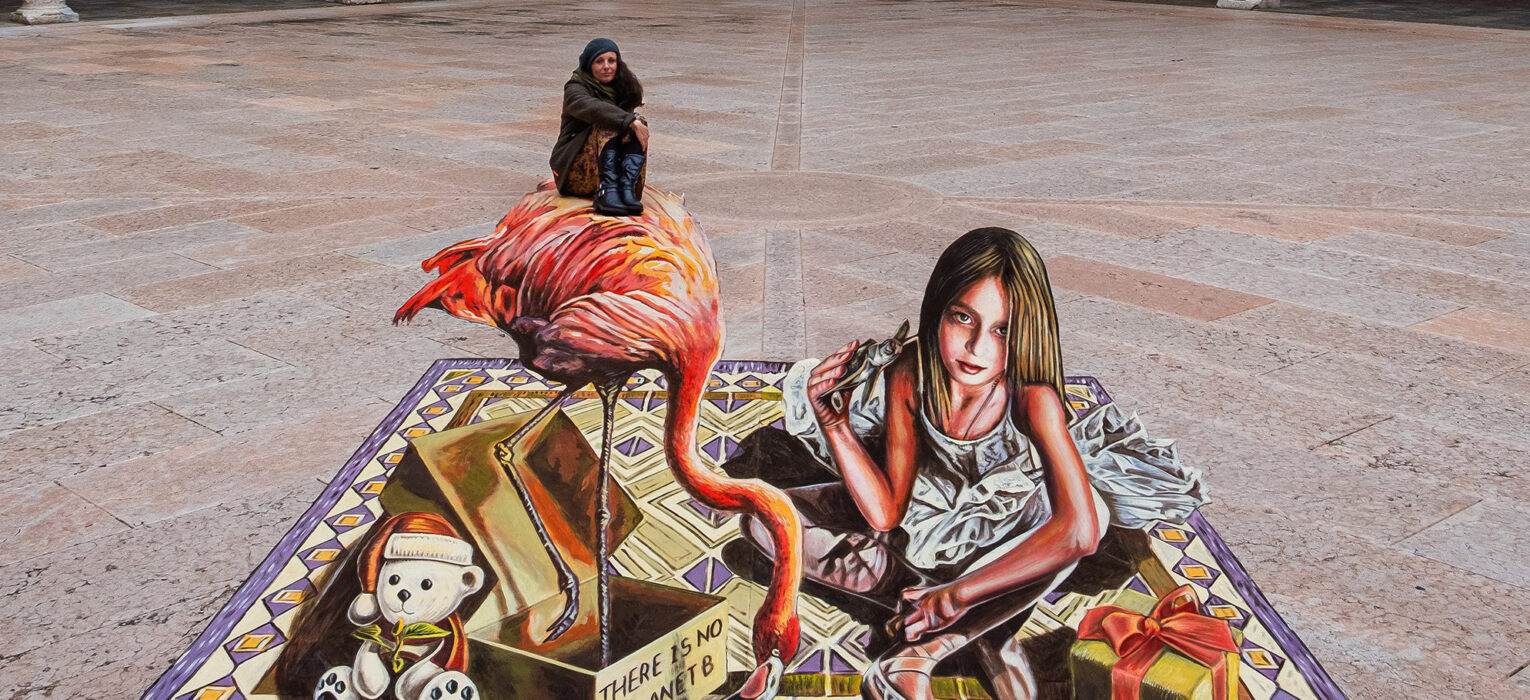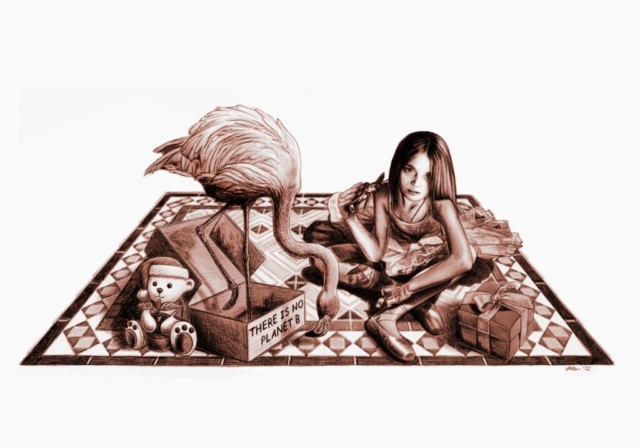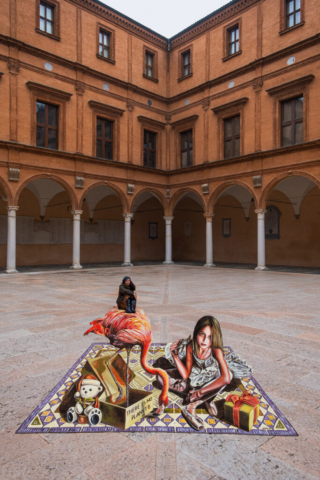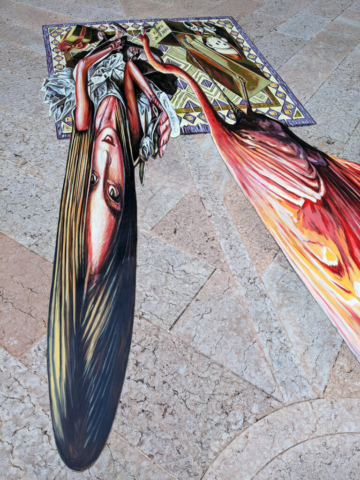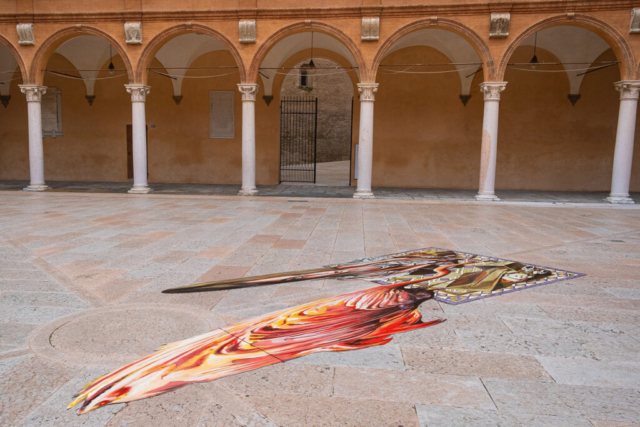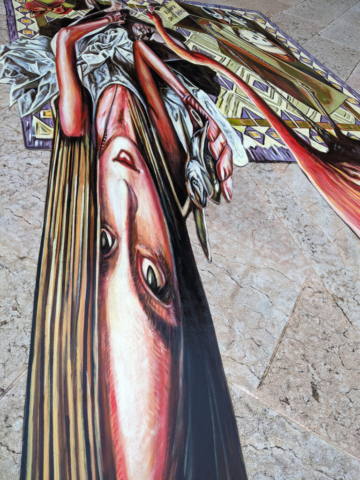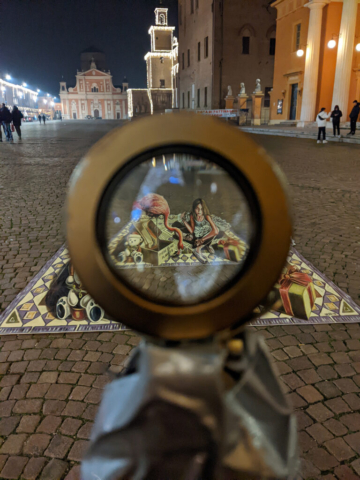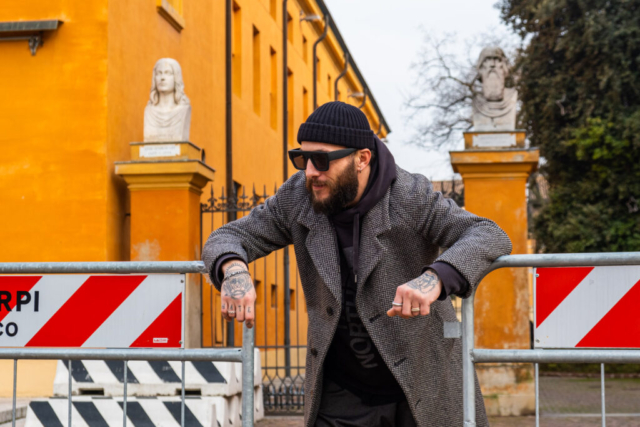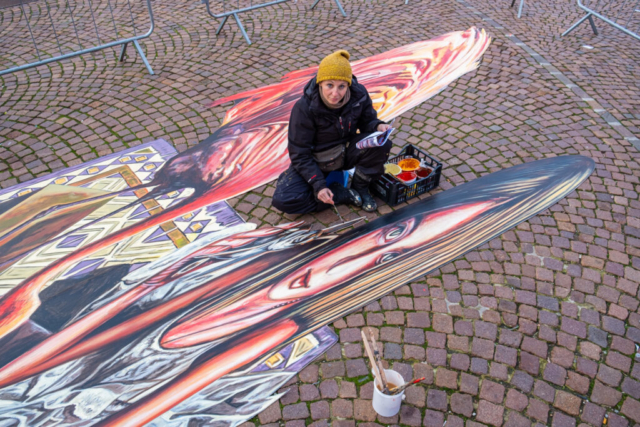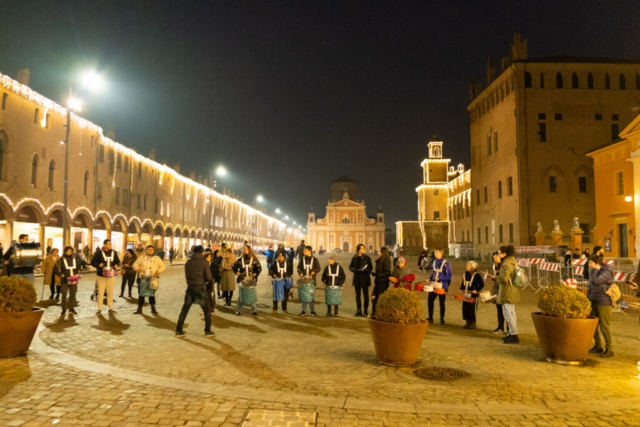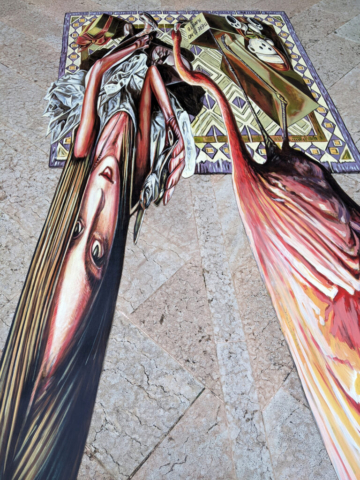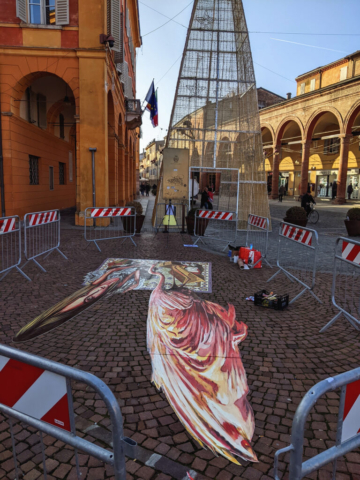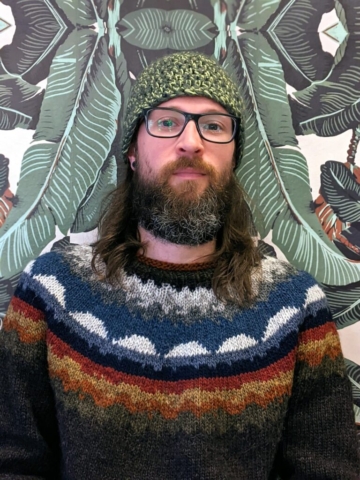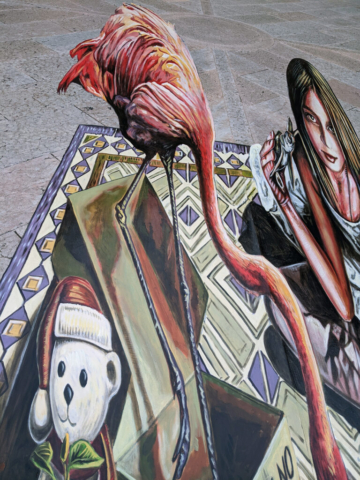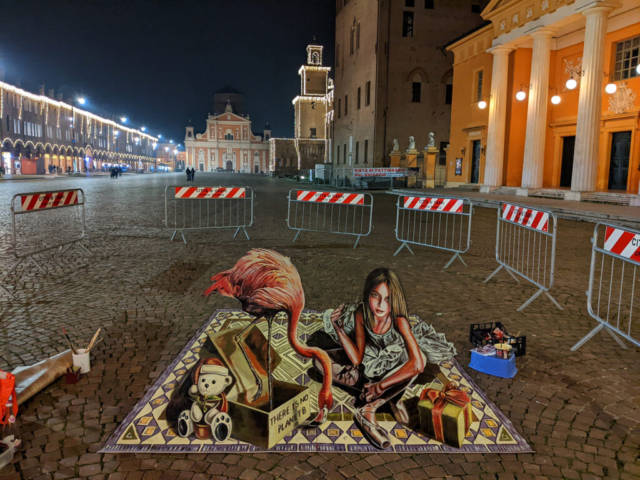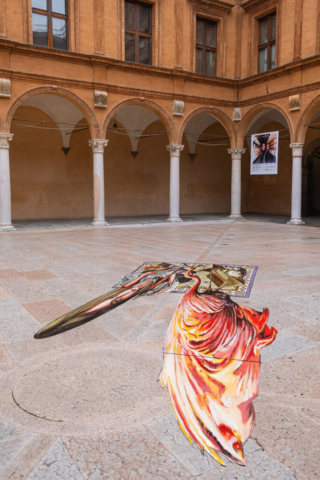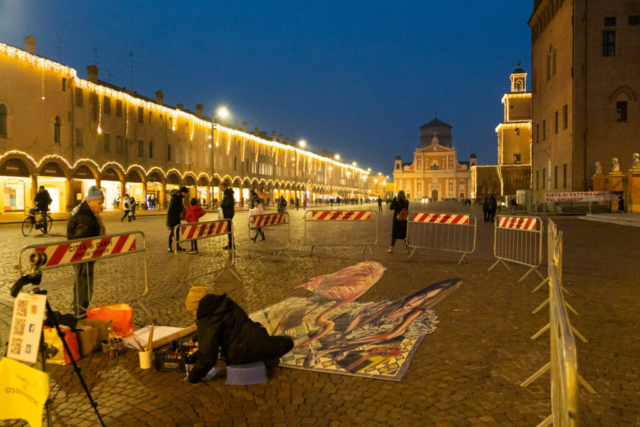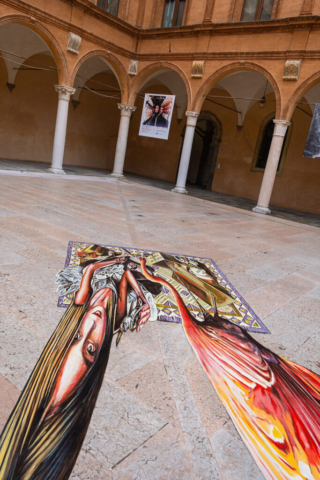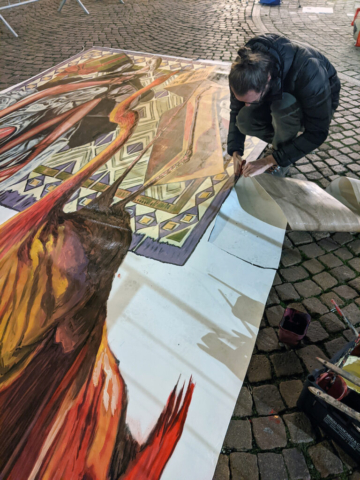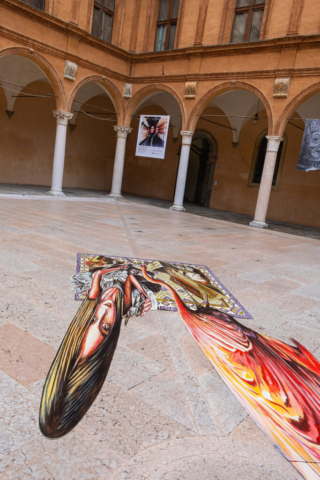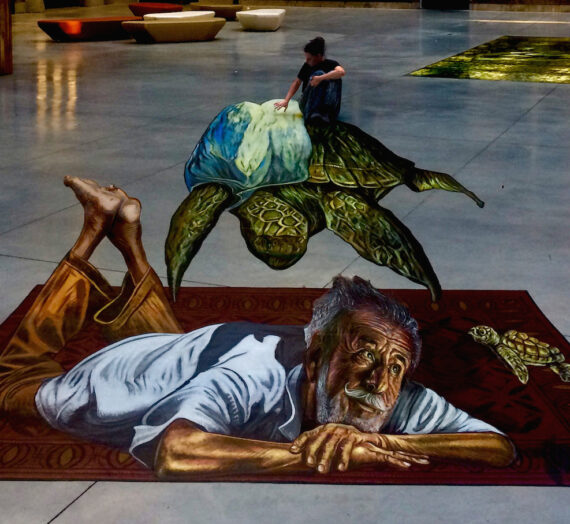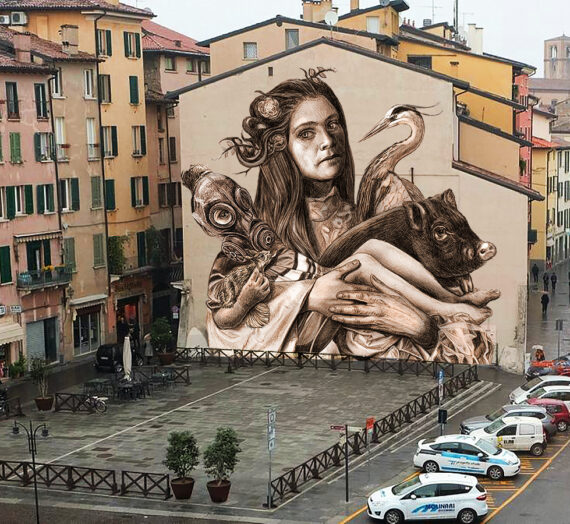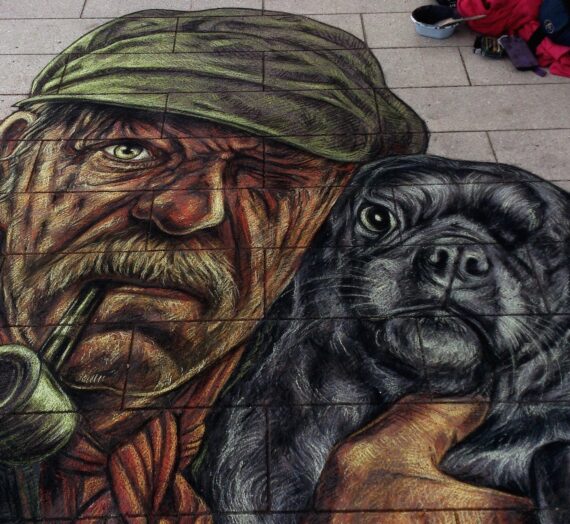Quando in giugno ho creato “Don’t let them get you down”, in Danimarca, l’ho dedicato al tema della deforestazione, ispirandomi alle tante storie di donne indigene che cercano di ostacolare come possono l’avanzata della rovina ambientale, in tutto il mondo. Secondo una stima della FAO infatti, dal 1990 al 2020 sono andati perduti nel mondo oltre 420 milioni di ettari di patrimonio arboreo.
Pensando ancora a tali vicende, e alle sempre più evidenti conseguenze dei cambiamenti climatici, ho creato un altro lavoro tridimensionale a terra, stavolta a Carpi (MO) e il titolo che ho voluto dargli è “Non esiste un pianeta B” (lo slogan ormai noto del movimento Fridays for Future).
L’opera è nata in collaborazione con l’Associazione “Carpi C’è” e con l’artista e amico Seba Mat.
Dovendo inserirmi in un contesto di feste natalizie ho voluto creare un pezzo surreale che pur raccontando dell’emozione di scambiarsi regali ha voluto mettere in luce alcune priorità che riguardano tutti. Una ragazzina, dopo aver indossato il desiderato completo da ballerina appena ricevuto in dono, siede su un tappeto e apre altri regali. Fra i pacchi, un orsetto polare peluche col berretto di babbo natale stringe fra le braccia un vaso che contiene piantina appena spuntata.
Il volto della ragazza appare serio e leggermente triste mentre in mano regge e mostra una piccola tartaruga. D’improvviso, da una scatola che non potrebbe certamente contenerlo, emerge un fenicottero rosa sbigottito. Si abbassa per capire meglio e il suo occhio giallo si posa accanto alla scritta che campeggia sul pacco: non esiste un pianeta b (per ciò non è possibile un piano b).
Il dorso dell’uccello, piccolo omaggio a Lewis Carroll, diventa la mia cavalcatura, mi ospita per qualche minuto rendendomi parte della scena, come in un sogno natalizio malinconico.
Vorrei che restasse qualcosa a chi osserverà l’opera, a chi si siederà in groppa al fenicottero, l’interazione in cambio di una riflessione sul presente e sul futuro.
Dobbiamo preoccuparci realmente della conservazione dei nostri ecosistemi e delle risorse naturali. Ci sono milioni di persone sfollate a causa dell’innalzamento del livello del mare, migliaia di morti in incendi boschivi, la siccità è diventata una piaga con critiche conseguenze, le emergenze alimentari e sanitarie sono all’ordine del giorno.
Il danno sembra irreparabile, lo penso spesso. Non mi metto a scrivere dei risultati della Cop27 di novembre e delle mie aspettative, ho sempre l’impressione che nonostante alcune buone intenzioni il cortocircuito fra istituzioni aziende e profitti la faccia sempre da padrone.
Spero utopisticamente che riusciremo ad essere realmente custodi di ogni creatura e della Terra che ci sostiene, rinunciando tutti a qualcosa. In questo le nuove generazioni, anche di giovanissimi, mi sembrano determinate. Dedico a loro l’opera di Carpi.
(And now in English)
When I created “Don’t let them get you down” in Denmark in June, I dedicated it to the theme of deforestation, inspired by the many stories of indigenous women who try to hinder the advance of environmental ruin as best they can, throughout the world. Indeed, according to an estimate by the FAO, between 1990 and 2020 more than 420 million hectares of trees were lost in the world.
Still thinking about these events, and the increasingly evident consequences of climate change, I created another three-dimensional work on the ground, this time in Carpi (MO) and the title I wanted to give it is “There is no planet B” (the slogan by now known of the movement Fridays for Future).
The work was created in collaboration with the “Carpi C’è” Association and with the artist and friend Seba Mat.
Having to insert myself in a context of Christmas holidays, I wanted to create a surreal piece which, while telling of the emotion of exchanging gifts, wanted to highlight some priorities that concern everyone.
A little girl, after wearing the coveted ballet outfit she just received as a gift, sits on a carpet and opens more presents. Among the parcels, a polar teddy bear wearing a Santa Claus hat holds in his arms a vase containing a newly sprouted seedling.
The girl’s face appears serious and slightly sad as she holds and shows a small turtle in her hand. Suddenly, from a box that certainly could not contain it, a dismayed pink flamingo emerges. She leans down to understand better and her yellow eye rests next to the writing that stands out on the parcel: there is no planet b (for this reason a plan b is not possible).
The back of the bird, a small homage to Lewis Carroll, becomes my mount, hosting me for a few minutes making me part of the scene, as in a melancholy Christmas dream.
I wish there was something left for those who will observe the work, for those who will sit on the back of the flamingo, the interaction in exchange for a reflection on the present and the future. We need to really care about conserving our ecosystems and natural resources.
There are millions of people displaced by rising sea levels, thousands of deaths in forest fires, drought has become a plague with critical consequences, food and health emergencies are the order of the day.
The damage seems irreparable, I often think so. I don’t start writing about the results of the COP27 in November and my expectations, I always have the impression that despite some good intentions the short circuit between corporate institutions and profits always dominates.
I utopianly hope that we will be able to really be guardians of every creature and of the Earth that supports us, giving up all of something. In this the new generations, even the very young, seem determined to me. I dedicate the work of Carpi to them.
